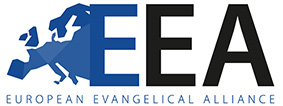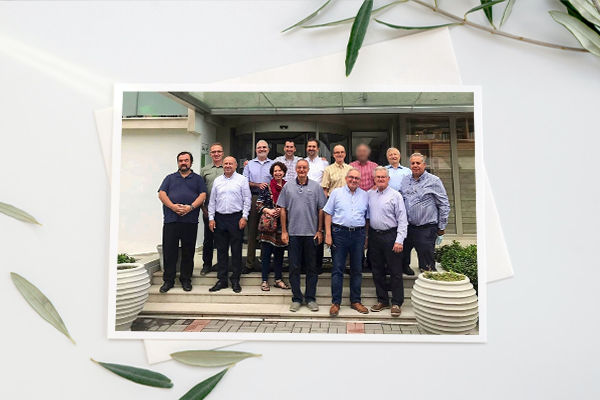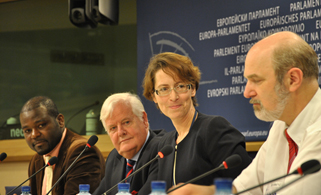By Bryan Carey, Peace Catalyst International
[…] In September 2021, I had the privilege to be invited as the keynote speaker and workshop leader for the […] [Balkan Meeting in Thessaloniki], specifically to talk about the biblical concept of peace and the work of peacebuilding. There were 16 leaders of National Evangelical Alliances from across the Balkans who attended the three-day conference, mostly in person and a couple online.
I was incredibly encouraged to see the relationships that these leaders have formed and the openness and honesty of the conversations. After emphasizing the importance of peace-oriented theology and peacebuilding practice just as much for Western countries as anywhere else in the world, I was excited by the reflective atmosphere that characterized our time together. We were able to reflect deeply together because questions about peace and peacebuilding are not only important when our societies are divided or violent conflict erupts. Rather, the biblical concept of shalom (usually translated as peace) runs through the entire biblical narrative and can or even should shape the culture and work of the Church.
During the conference, we had about 10 hours of contact time through a series of 5 workshops and several short addresses. I began with a bold claim:
Shalom and shalom-building are God’s own vision and mission, so shalom and shalom-building provide a comprehensive framework to shape all the activities and work of the Church.
The biblical portrait of shalom is much richer than a single world can capture, and biblical translations use a whole range of words to capture its multifaceted meaning. Shalom is a hermeneutical key that can unlock how we understand God’s comprehensive work through the biblical story: God is the God of peace, the source of shalom, and the one working to establish shalom from beginning to end. Jesus assumed the role of the Messianic King who would come and establish shalom, and he did so in ways that surprised Jewish expectations, as he proclaimed and enacted the shalom of God’s reign, confronted injustice and oppression, healed harms, and restored what was broken. When Jesus calls us to follow him, he is inviting us to participate in his shalom work now as first-fruits for his already but not-yet kingdom.2
There are three moments from the conference that provide a glimpse of the significance of our time together:
Vulnerable Self-Reflection
First, before digging into this biblical portrait of shalom during the conference, we began with a visioning activity, where we all spent time individually and as small groups to imagine what it would be like if we experienced healing and flourishing in all our relationships: with God, our own self (our identity), with others, and with the good creation. One small group reflected to everyone, “If we were really experiencing shalom with God and our own identity, then we could self-reflect and self-criticize more without feeling insecure or afraid.”
Experienced leaders recognize how difficult it is to cultivate a safe space in which self-reflection and self-criticism are possible so that we might learn and grow. When meeting across ethnic divisions and discussing difficult topics, this becomes even more difficult. The 16 leaders of national evangelical alliances, the person responsible for socio-political matters the European Evangelical Alliance (EEA), and the EEA General Secretary were all honest and reflective, which created a beautiful opportunity for deeper connection and mutual learning.
Truth, Mercy, Justice, and Peace
After spending some time exploring the biblical portrait of shalom, we began to investigate what it might mean to follow Jesus in the work of “shalom-building” as the Church (i.e. building a positive peace3). Prior to this specific workshop, a few of the evangelical alliance leaders had voiced their honest concerns about peacebuilding. For example, peacebuilding has the potential to sacrifice a commitment to the truth. Doesn’t the truth matter most because it is the truth about Jesus that transforms people? During this workshop, we addressed this and similar concerns directly.
We began with Psalm 85:10, “Truth and Mercy have met together. Justice and Peace have kissed.”4 This verse occurs in the context of a prayer for God’s shalom and a promise of God’s salvation. These four concepts, then, seem to be part of God’s salvation work in order to make God’s complete shalom real.
Christian peacebuilder John Paul Lederach developed a workshop based on this verse. After noticing how the psalmist seems to treat these four concepts as living characters, he began to invite people in a conflict zone to investigate the competing interests of Truth, Mercy, Justice, and Peace. In Lederach’s book, The Journey to Reconciliation, he writes a skit that developed from years of experience hearing about the competing interests, needs, and fears of each of these characters.
During our workshop, we enacted this skit, listening to and then reflecting on the needs and fears of each of these character-concepts and the tensions that exist among them. Then in another activity we applied this learning to the life of Jesus. We imagined these four characters discussing amongst themselves how Jesus embodied and taught about each of them. Finally, these four characters became the basis to reflect on the activities and work of our churches.
Personally, I will not forget these leaders becoming Truth, Mercy, Justice, and Peace and engaging honestly with one another about the tensions and balances that exist between the characters. Many leaders shared about how much more they would be processing this experience as they went home to their own churches and networks.
One such excerpt from Lederach that prompted a lot of reflection during our time together:
Truth looked first at Mercy. “You must slow down, Brother Mercy. Give me a chance to emerge. Our child Forgiveness cannot be born without the slow development in the womb of the mother.” Mercy nodded. “Shine bright, dear Sister Truth. But please take care not to blind and burn. Remember that each person is a child of God. Each is weak and needs support to grow.”5
A Comprehensive Framework
Third and finally, I want to highlight the significant claim with which we began the conference:
Shalom and shalom-building are God’s own vision and mission, so shalom and shalom-building provide a comprehensive framework to shape all the activities and work of the Church.
In spite of very real concerns at the outset, several leaders who attended reflected back that shalom is helping to provide an integrated, comprehensive framework for their Christian life and work. Shalom fits together so many pieces of our discipleship journeys and church work that can often feel separate and disconnected. A shalom-building framework also provides an impetus to learn practical peacebuilding skills that help Christians grow on our discipleship journeys so that we can participate in Jesus’s work to heal relationships and restore what has been broken.
Thomas Bucher, the General Secretary of the European Evangelical Alliance and conference organizer, concluded our time together saying:
My understanding of Peace & Reconciliation at the beginning of these days was strongly related to situations of conflict. And now I have realised that Shalom is much more inclusive. It is like a filter that affects all areas of life, a comprehensive framework for all that the Church is and does. As we go home now, we need to rethink how all the activities of our Evangelical Alliances align even more with this larger vision.
Notes & References:
-
I write more about this here, and I specifically reference the Secretary General of the World Evangelical Alliance Thomas Shirrmacher and his speech “Catholics and Evangelicals and their future relations.” Schirrmacher shared about how “the topic of Catholic-Evangelical relations has become more urgent” as many international churches are becoming closer theologically to evangelical churches, which is “rapidly increasing the number of theologically conservative churches who are contemplating how they will relate to the Catholic Church” (pg 2). The same dynamic is true regarding how international Protestant churches are contemplating their relationships with the Orthodox Church, secular groups, Muslim communities, and many others as part of wider society.
-
This paragraph is adapted from an article that Peace Catalyst International colleagues and I wrote: Peace Catalyst International staff, “Shalom,” October 2021.
-
The Biblical idea of shalom overlaps significantly with the idea of “positive peace” in the field of peacebuilding and conflict transformation. Rev. Dr. Martin Luther King, Jr. preached about this positive peace: “Peace is not merely the absence of some negative force — war, tensions, confusion but it is the presence of some positive force — justice, goodwill, the power of the kingdom of God.” From King, Martin Luther, Jr., “When Peace Becomes Obnoxious,” sermon, Dexter Avenue Baptist Church, Montgomergy AL, March 18, 1956. Accessible here.
-
This is a direct translation from the Spanish verse in which this workshop was developed by peacebuilder John Paul Lederach in Nicaragua. The actual four words in Hebrew are chêsêd (steadfast love, goodness, kindness, faithfulness with a much more gentle and patient connotation), ’emeth (firmness, faithfulness, truth), tsedeq (justice, rightness, righteousness, much more about a cause and even governance, not individual morals), and shâlôm (completeness, soundness, welfare, peace), and they occur in the context of a prayer for God’s shalom and a promise of his salvation.
-
John Paul Lederach, Journey to Reconciliation (Herald Press, 1999), 59.







